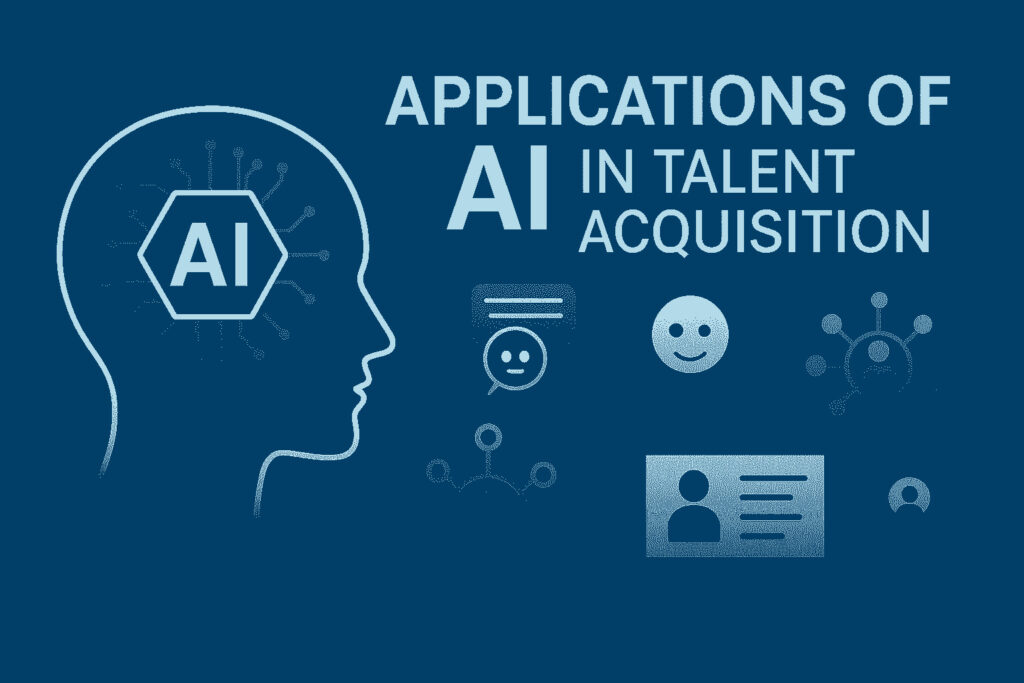The recruitment landscape is evolving rapidly, driven by artificial intelligence (AI) innovations. From streamlining processes to enhancing candidate experience, AI is becoming indispensable for modern talent acquisition. This blog explores how AI is revolutionizing recruiting, supported by examples, statistics, and best practices.
-
The Rise of AI in Recruitment
AI’s adoption in recruitment has surged due to its ability to process vast amounts of data, identify patterns, and automate repetitive tasks. In 2023, the global market for AI in recruitment was valued at $1.8 billion and is projected to grow at a 22.6% CAGR through 2030 (Grand View Research).

-
Applications of AI in Talent Acquisition
A. Resume Screening and Matching
Traditional resume screening is time-consuming. AI tools use Natural Language Processing (NLP) to analyze resumes and match candidates to job descriptions with remarkable precision.
- Example: Unilever implemented AI-driven screening, reducing their recruitment process from four months to two weeks and improving candidate satisfaction.
B. Chatbots for Candidate Engagement
AI-powered chatbots answer FAQs, schedule interviews, and provide updates, ensuring a seamless candidate experience.
- Stat: 58% of candidates feel chatbots improve their hiring experience (AllyO Study).
- Example: L’Oréal’s chatbot, Mya, handles 1.2 million conversations annually, speeding up the pre-screening process.
C. Predictive Analytics
AI predicts candidate success based on historical data, ensuring quality hires and reduced turnover.
- Example: IBM uses AI to analyze candidate traits and predict cultural fit, contributing to a 25% reduction in turnover.
D. AI-Enhanced Sourcing
AI identifies passive candidates by analyzing profiles across LinkedIn, GitHub, and other platforms, targeting top talent.
- Example: Tools like HireVue and Entelo deliver 3x faster sourcing by identifying ideal candidates based on predefined parameters.
-
Benefits of AI in Recruitment
- Efficiency Gains: AI automates repetitive tasks like shortlisting, enabling recruiters to focus on strategic activities.
- Cost Reduction: Automating tasks cuts recruitment costs by up to 30% (McKinsey).
- Diversity and Inclusion: AI mitigates unconscious bias by anonymizing candidate profiles during screening.
- Example: Pymetrics’ AI algorithm removes demographic data to ensure unbiased assessments.
-
Challenges and Ethical Considerations
While AI offers immense benefits, challenges persist:
- Bias in Algorithms: Poorly designed AI systems can perpetuate existing biases. For instance, Amazon’s AI recruitment tool was scrapped after it was found to favor male candidates for technical roles.
- Transparency: Candidates often feel uneasy about AI-driven decisions. Clear communication is essential to build trust.
- Data Privacy: Organizations must adhere to GDPR and similar regulations to protect candidate data.
-
The Role of AI in Enhancing Candidate Experience
AI doesn’t just streamline processes; it transforms the candidate experience:
- Personalized Recommendations: AI suggests tailored job opportunities based on a candidate’s skills and preferences.
- 24/7 Support: Chatbots provide real-time responses, reducing candidate frustration.
- Faster Decisions: AI-driven processes cut time-to-hire, ensuring top candidates remain engaged.
- Example: Siemens uses AI to deliver real-time application status updates, significantly improving candidate satisfaction.
-
The Future of AI in Recruitment
As technology advances, the future holds even greater promise for AI in recruitment:
- Voice and Video Analysis: AI tools like HireVue analyze tone, body language, and keywords during interviews to assess candidate suitability.
- Predicting Workforce Needs: AI forecasts future talent requirements, ensuring readiness for market changes.
- Hyper-Personalized Outreach: AI enables targeted, data-driven communication, boosting engagement with passive candidates.
-
Best Practices for Implementing AI in Recruitment
To maximize AI’s potential:
- Focus on Data Quality: Ensure accurate, unbiased data to train AI models.
- Combine AI with Human Judgment: Use AI for insights, but let recruiters make final decisions.
- Train Teams: Equip HR teams with the skills to use AI tools effectively.
-
Case Studies
- Unilever: Saved over 50,000 HR hours annually using AI-powered assessments and video interviews, reducing time-to-hire by 75%.
- Hilton: Integrated AI to prescreen candidates, achieving a 90% faster screening process and enhancing candidate experience.

Conclusion
AI is revolutionizing talent acquisition by enhancing efficiency, reducing bias, and delivering superior candidate experiences. By combining AI’s capabilities with strategic human oversight, organizations can transform their recruitment processes to attract top talent and build competitive advantages. As the technology matures, its integration into HR processes will no longer be optional but a necessity for success.

